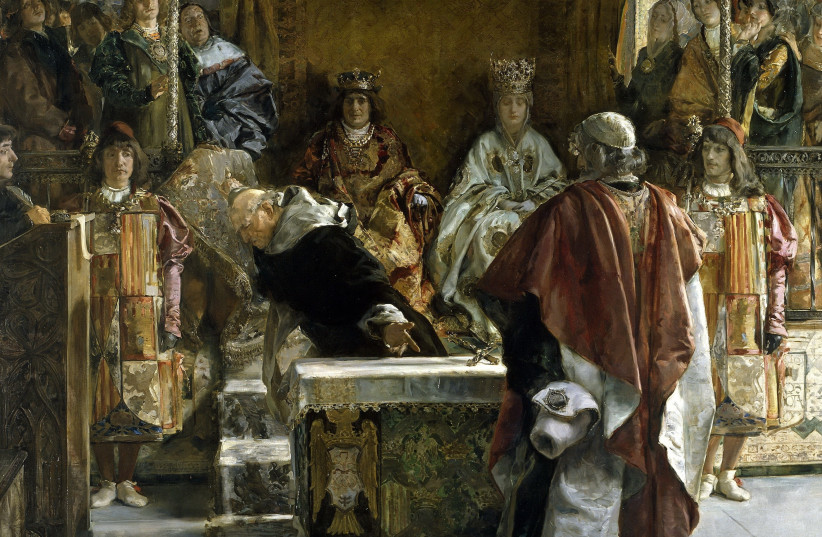The scene is idyllic; cruising smoothly along Portugal’s Douro River, we pass miles of lush green forests and hundreds of quaint country homes and farms which line the river’s edge. Verdant vineyards appear periodically – testifying to Portugal’s famous wine industry – and majestic mountains in the distance look gently down upon the landscape.
It is difficult to imagine that this pleasant and pastoral land was witness to what was arguably the millenium’s most catastrophic Jewish tragedy until the Holocaust – the Spanish Inquisition, which may even have provided the template for the horrors of the Shoah.
In 1391, violent anti-Jewish pogroms broke out throughout Spain. Hundreds of Jews were killed and synagogues were burned down in Seville, Cordoba, Valencia and Barcelona.
There followed the mass conversions of thousands of surviving Jews who were forcibly baptized under threat of death. This created a new category of Jews: Conversos, or “New Christians.” Ironically, while they abandoned their Judaism, as nominal Christians these (former) Jews were now free to pursue heretofore prohibited activities in commerce, real estate and even government.
But as time went on, the local population suspected that many of the New Christians were actually leading a dual life: outwardly, they were every bit as Christian as their neighbors; but in the confines of their homes, many were secretly still practicing Jewish laws and customs. And so, in 1478, King Ferdinand and Queen Isabella established the Inquisition, to uncover and prosecute those Jews who were hiding their true faith.

The Inquisition would launch a wave of terror against Jews not only in Spain, but also in far-flung communities under the rule of Catholic authority – from Goa to Brazil to Mexico – and would continue for almost four centuries, characterized by the most brutal inhumanity and torture known to man. (As many as 20,000 Jews would die and 150,000 be converted; it is estimated that today there are 100 million descendants of Crypto Jews, including 5% of all Spanish males.)
In 1492, all Jews who had not converted were expelled from Spain; those who had converted became Catholics and thus subject to the Inquisition. Thousands of Jews fled to neighboring Portugal, which established its own Inquisition in 1536, designed to seek out the Crypto-Jews and persecute them. Many were burned alive or beheaded, or summarily executed after tribunals in Lisbon, Porto and Coimbra. Yet despite the risk to their lives, some families clung to their Judaism and surreptitiously lit Shabbat candles, baked matzah on Passover and recited Hebrew prayers from memory.
WE VISITED the small town of Belmonte, where we met members of the Crypto-Jewish community that has emerged from the shadows after hundreds of years of hiding.
Since the Inquisition, generation after generation has passed down its Jewish traditions in muted tones, with members revealing the truth of their identity to their children only when they felt it would remain secret.
By and large, it has been the courageous women of the family who have guarded the faith, since it was only in their domain – the home – where Judaism was practiced.
Today, the small community, which became known to the world at large in 1917, has its own synagogue, generously built by an American benefactor, as well as a rabbi and a kosher food store. The community built a museum to chronicle its struggle, and has connected to other Crypto-Jewish communities in Peru, Monterrey and New Mexico. It meets on Shabbat and holidays, and is frequently visited by Jews from throughout the world, who offer support and encouragement.
Its liberation has also caused the community to dwindle, as many of its members have departed for Israel to live and study.
Ironically, as historian Dr. Henry Abramson put it, “their success has contributed to their downfall; by retaining the flame of Judaism, they prepared their youngest generation to make aliyah to Israel. The destiny of Belmonte may be to ultimately remove the flame from Portugal, but it will burn bright in the Jewish homeland.”
The visit to Belmonte had a deep effect on me. I felt the presence of so many of my coreligionists throughout the centuries who had exhibited the highest level of mesirat nefesh, self-sacrifice, in order to maintain their faith under the harshest of circumstances. At any moment, they might have been found out and murdered, yet they steadfastly refused to abandon their God and give in to the forces of evil. The Church hunted them, their neighbors suspected them, yet they clung to their beliefs.
And so I find it cryptic and disheartening that so many Jews – who have complete and total freedom to practice their Judaism – have either ignored or abandoned it. Throughout the world, countless Jewish communities are rapidly shrinking or disappearing, as assimilation and intermarriage take their deadly toll.
Has it become too easy to be Jewish? Have we taken Judaism so much for granted that it has lost its appeal and surrendered to the fashions of the day? Do we, God forbid, need the prodding of antisemitism to jolt us out of our complacency and remind us of who we are?
Throughout our travels, we search for evidence of long-abandoned synagogues. We examine the walls of homes in neighborhoods that once were Jewish, looking for signs of mezuzot that formerly graced their exterior. We see pictures of once-flourishing communities and wonder where the descendants of these people have gone.
The souls of Spain and Portugal’s legendary Jewish presence – which boasted such iconic heroes as Shmuel Hanagid, Yehuda Halevi, Dona Gracia, Don Isaac Abarbanel and Nahmanides – must surely be crying out and pleading to us to openly, proudly, actively express our glorious tradition, rather than relegate it to some darkened basement in the dead of night.
Let it, rather, burst forth into the light and illuminate the way for the generations to come.
The writer, director of the Jewish Outreach Center of Ra’anana, leads tours and cruises to places of Jewish interest around the world; jocmtv@netvision.net.il
